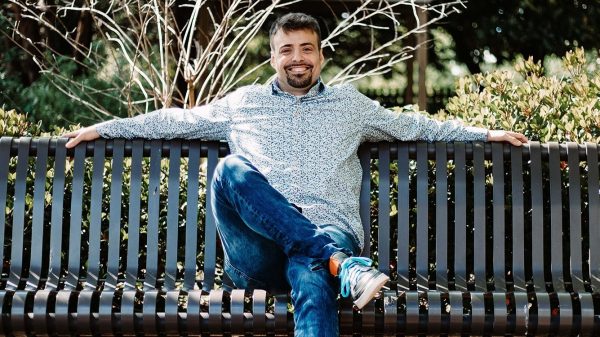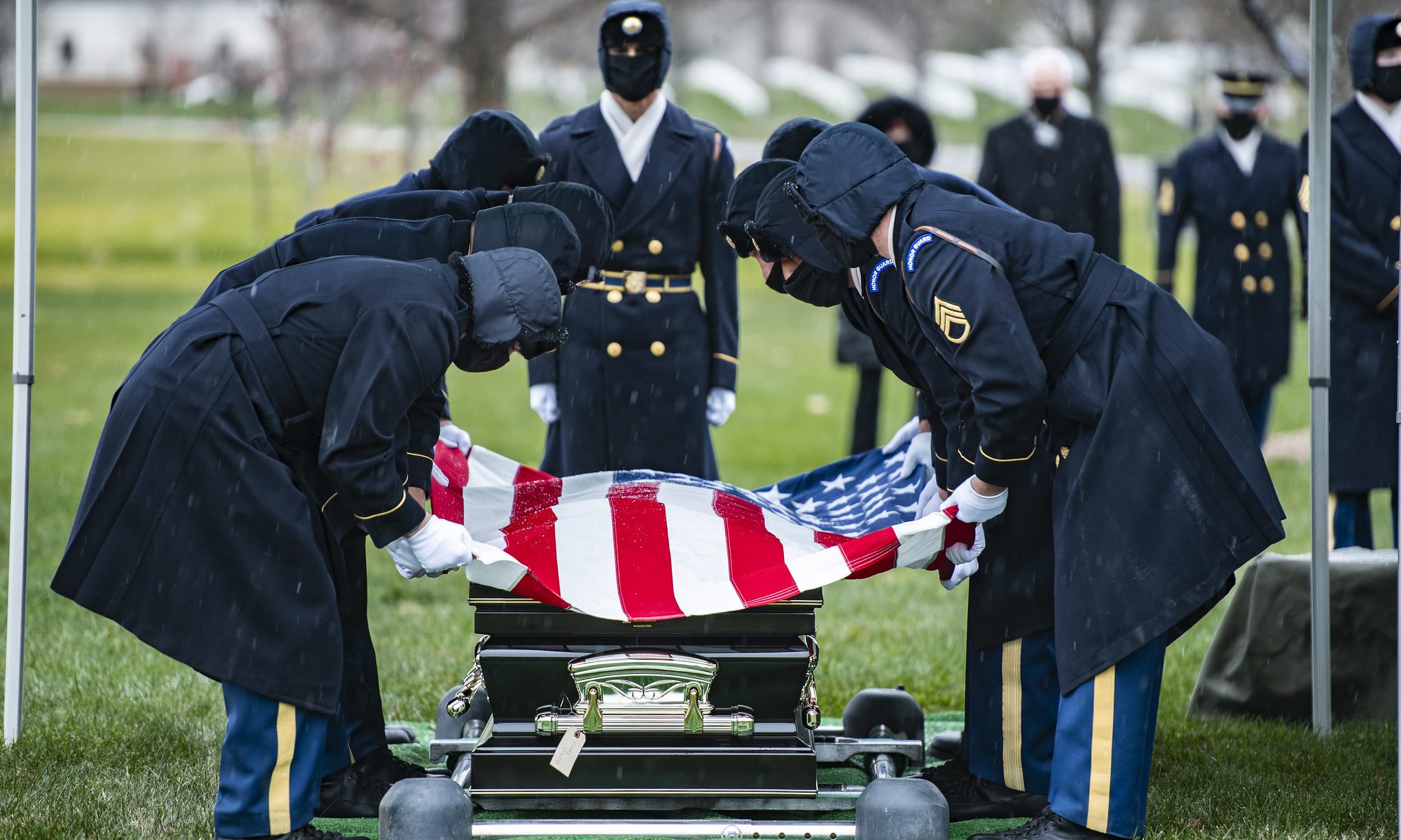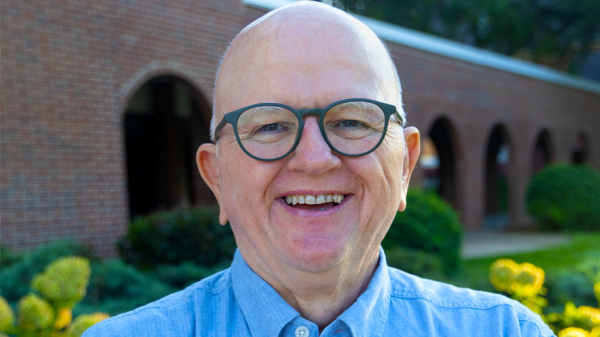Command Sgt. Major Adkins, a resident of Opelika, was buried at Arlington National Cemetery this week after passing away from COVID-19 complications in April.
Adkins received the Medal of Honor at a White House ceremony in 2014 for acts of heroism during the Vietnam War. Adkins was buried with full military honors at Arlington National Cemetery.
Soldiers of the 3rd U.S. Infantry Regiment (The Old Guard) had the sacred duty of rendering honors for Adkins in Section 12A of Arlington National Cemetery.
Adkins was awarded the Medal of Honor on Sept. 15, 2014, for his actions as an intelligence sergeant with Detachment A-102, 5th Special Forces Group – Airborne, 1st Special Forces Command – Airborne, during combat operations against an armed enemy at Camp A Shau, Republic of Vietnam, from March 9-12, 1966.
During the 38-hour battle and 48 hours of escape and evasion, Adkins fought with mortars, machine guns, recoilless rifles, small arms and hand grenades, killing an estimated 135 to 175 of the enemy and sustaining 18 different wounds.
Today, the @USArmyOldGuard and @theusarmyband conduct modified military funeral honors with funeral escort for Medal of Honor Recipient U.S. Army Command Sgt. Maj. Bennie Adkins in Section 12 of Arlington National Cemetery.
U.S. Army photos by Elizabeth Fraser pic.twitter.com/ySbyJiiiMX
— Arlington National Cemetery (@ArlingtonNatl) December 16, 2020
Following his time in service, Adkins taught educational classes to help others pursue college educational opportunities. He founded the Bennie Adkins Foundation to provide college scholarships to non-commissioned special forces officers to help their transition to civilian life.
Adkins dedicated his life to service. As then-President Barack Obama said during the presentation of the Medal of Honor: “The first thing you need to know is when Bennie and I met in the Oval Office, he asked if he could sign back up.”
“Medal of Honor Recipient Bennie Adkins was laid to rest today at Arlington National Cemetery,” Congressman Mike Rogers wrote on social media. “Thanks to the U.S. Army for their extreme care and duty in rendering his final honors.”
Alabama Secretary of State John Merrill said on social media: “This morning, #MedalofHonor Recipient Bennie G. Adkins was laid to rest at Arlington National Cemetery. He was awarded the Medal on Sept. 15, 2014, for his actions during the #VietnamWar. He passed away on April 17, 2020. Cindy & I were in attendance to show our respect for him!”
“It is with sadness and humility that I ask this body to pause for a moment to remember and honor a great American and a citizen of my home state, Command Sergeant Major Bennie G. Adkins, who died of complications related to the COVID-19 virus on April 17, 2020,” U.S. Sen. Doug Jones, D-Alabama, said on the floor of Congress. “He was laid to rest with full military honors this morning after a funeral service in the chapel at Arlington National Cemetery.”
“Command Sergeant Major Adkins, known to friends and family as ‘Bennie,’ received the Medal of Honor at a White House ceremony on September 15, 2014, for acts of heroism during the Vietnam War,” Jones said. “Although Bennie was recommended for the Medal of Honor at the time, he was instead given the next-highest award, the Distinguished Service Cross. In 2002, the Army began reviewing Distinguished Service Cross awards for possible upgrades, and finally, forty-eight years later, President Obama bestowed a well-deserved Medal of Honor upon Bennie Adkins.”
“So it is with gratitude and a deep sense of loss that we remember this extraordinary man,” Jones said. “The facts of the events that led to Bennie Adkins’ recognition bear mention. However, as President Obama said when presenting Bennie with the Medal, ‘I have to be honest, in a battle and daring escape that lasted four days, Bennie performed so many acts of bravery we actually don’t have time to talk about all of them.’ I will, therefore, attempt to summarize, combining information from the citation that accompanied the award, media accounts of the events, and quotes from Bennie’s memoir.”
“When Camp A Shau was attacked by a large Viet Cong force early on March 9, 1966, then-Sergeant First Class Adkins rushed through intense hostile fire to man a mortar position,” Jones said. “Although wounded himself by incoming fire, Bennie briefly relinquished his mortar to a comrade and ran through exploding mortar rounds in order to drag several wounded Americans to safety. During the battle, Bennie later recalled, bullets hit and killed one man he was carrying on his back. At another point, Adkins, a former baseball catcher, caught a North Vietnamese hand grenade in mid-air and flung it back at the enemy.”
“Over the course of four days, Bennie repeatedly exposed himself to hostile fire while rescuing and helping evacuate his fellow soldiers, retrieving additional munitions, and repelling repeated waves of attacking enemy soldiers,” Jones said. “Bennie suffered 18 wounds — including to an eye and his torso — but managed to kill an estimated 135 to 175 enemy troops. Because of his efforts to carry a wounded soldier to an extraction point rather than leave him behind, Bennie and his group were unable to reach the last evacuation helicopter. Running extremely low on ammunition, he returned to the mortar pit, gathered additional ammunition, and ran through intense fire back to the communications bunker. After being ordered to evacuate the camp, Adkins and the remaining small group destroyed all signal equipment and classified documents, then fought their way out of the camp and into the jungle, where they evaded the pursuing North Vietnamese Army for two days.”
“Their escape was aided by the sawed-off shotgun Bennie carried as a sidearm and by the unexpected intervention of an Indonesian tiger,” Jones continued. “Trapped in the jungle, the group’s radio damaged in the battle, Adkins managed to rig his shotgun as an antenna, enabling him to communicate their location to friendly forces. As the group endured a second night in the jungle waiting for help to arrive, the tiger, which had been hunting nearby, frightened off the enemy, giving Adkins and the others an opportunity to create a makeshift landing pad for a rescue helicopter the next morning.”
“Remarkable as those details are, the facts of Bennie’s post-service life are equally worthy of note,” Jones said. “Bennie and his wife Mary were married for more than 60 years — until she passed away in 2019. They don’t give medals for that, but I know from observing my own parents’ 60-plus years together that, no matter who the couple are, that kind of dedication, loyalty, and commitment are special. After 20 years of service in the Army, Bennie retired and went back to school. He earned three degrees from Troy University — a bachelor’s in finance and two master’s degrees — and opened his own accounting firm in Auburn. Then, Bennie began deploying his charisma, his wit, his way with people, and his resources to help others pursue their goals through education. For several years, Bennie taught night classes at Alabama’s Southern Union Junior College and Auburn University, as well as GED classes at the local jail. Later, he established The Bennie Adkins Foundation, which to date has provided about 50 educational scholarships to noncommissioned Special Forces officers.”
“Bennie’s dedication to the service of his country and to his fellow Americans never waned,” Jones stated. “For many years he traveled extensively, in what he described as his fourth career, “trying to instill patriotism in our young people.” And according to President Obama in 2014, “the first thing you need to know is when Bennie and I met in the Oval Office, he asked if he could sign back up. His lovely wife was not amused.”
“I know that for Bennie’s family and his community, this is a loss impossible to describe or to measure,” Jones said. “My wife Louise joins me in sending our sincerest condolences to Bennie’s daughter Mary Ann Adkins Blake (David), to his sons Michael Adkins (Christine), and Keith Adkins (Jaime), and to his many grandchildren and great-grandchildren.To paraphrase his Medal of Honor citation, Bennie Adkins’ extraordinary life reflects great credit upon himself, his family, and his country. May he rest in peace and may God bless the United States of America.”
“In the history of this country, the Medal of Honor has been awarded 3508 times,” Jones said. “Fewer than 70 of those recipients are still alive today.”





















































